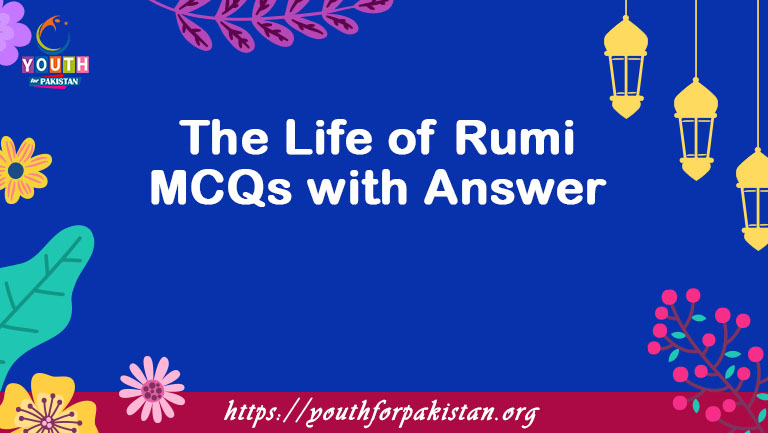The following are The Life of Rumi MCQs with answers related to Islamic Studies. We have arranged the most important and repeated MCQs in all the competitive examinations. The students can clear their concepts for The Life of Rumi MCQs online quiz by attempting these.
The Life of Rumi Online MCQs with Answers
What is the full name of Rumi, the famous Persian poet and mystic?
a) Jalaluddin Muhammad Rumi
b) Ali ibn Abi Talib
c) Umar ibn al-Khattab
d) Abdullah ibn Abbas
Rumi is best known for his poetry written in the form of __________.
a) Sonnets
b) Quatrains (Rubaiyat)
c) Haikus
d) Limericks
Rumi’s poetry is often associated with which Sufi order?
a) Naqshbandi
b) Chishti
c) Mevlevi (Whirling Dervishes)
d) Qadiri
Which city is Rumi’s mausoleum located in, where he is buried?
a) Isfahan
b) Istanbul
c) Konya
d) Samarkand
Rumi was born in the 13th century in what is now modern-day __________.
a) Iran
b) Afghanistan
c) Turkey
d) Pakistan
What is the term for Rumi’s spiritual teacher and mentor, whose teachings deeply influenced him?
a) Sheikh Zayed
b) Ibn Sina
c) Shams Tabrizi
d) Ibn Khaldun
Rumi’s poetry is primarily written in which language?
a) Arabic
b) Persian
c) Urdu
d) Turkish
Rumi’s most famous work, “Mathnawi” or “Masnavi,” is often referred to as the __________.
a) Divine Comedy
b) Odyssey
c) Persian Quran
d) Spiritual Couplets
Which of the following themes is often explored in Rumi’s poetry?
a) Military conquests
b) Romantic love
c) Political satire
d) Scientific discoveries
Rumi’s poetry reflects his deep connection to __________.
a) Islamic theology
b) Greek philosophy
c) Hinduism
d) Sufi mysticism
What is the term for the practice of whirling in circles as a form of meditation and devotion, often associated with Rumi’s followers?
a) Tawaf
b) Zikr
c) Sama
d) Hajj
Rumi’s poetry often expresses the idea of seeking union with the __________.
a) Beloved (God)
b) Earth
c) Moon
d) Stars
Rumi’s famous poem collections “Divan-e Shams-e Tabrizi” are dedicated to __________.
a) His wife
b) His children
c) His spiritual teacher, Shams Tabrizi
d) His king
In addition to poetry, Rumi also wrote prose works that emphasized the importance of __________.
a) Logic and reason
b) Political leadership
c) Religious dogma
d) Spiritual transformation
Rumi’s poetry often uses metaphors of __________ to convey spiritual concepts and longing.
a) Birds and flight
b) Flowers and gardens
c) Oceans and waves
d) Mountains and valleys
What is the term for the rhythmic and repetitive vocalization of the name of God or other religious phrases, a practice often associated with Sufi rituals and Rumi’s followers?
a) Dhikr
b) Salat
c) Shahada
d) Fasting
Rumi’s poetry has been translated into many languages and has gained a wide readership in __________.
a) Europe
b) Asia
c) Africa
d) All of the above
Rumi’s poetry emphasizes the idea that love for the Divine is a universal and inclusive force that transcends __________.
a) Language
b) Gender
c) Religion
d) All of the above
The Mevlevi Order, also known as the Whirling Dervishes, was founded to honor and continue the teachings of Rumi and Shams Tabrizi. In their famous Sama ceremony, they whirl in a specific direction, symbolizing __________.
a) The Earth’s rotation
b) The sun’s movement
c) Spiritual ascent
d) Meditation
Rumi’s poetry often encourages individuals to look inward and explore their own __________ in the search for God.
a) Dreams
b) Desires
c) Emotions
d) Hearts
Rumi’s works have had a profound influence on literature and spirituality, and he is often regarded as one of the greatest __________ poets in history.
a) Persian
b) Arabic
c) Urdu
d) Turkish
Which of Rumi’s family members also became a notable poet and spiritual figure, following in his footsteps?
a) His son, Sultan Walad
b) His wife, Kerra Khatun
c) His daughter, Fatimah
d) His brother, Amir Khusrau
Rumi’s poetry often reflects the idea that love for the Divine can serve as a bridge between __________.
a) Earth and heaven
b) Rich and poor
c) Knowledge and ignorance
d) East and West
What is the term for the practice of reciting Rumi’s poetry as a form of devotion and meditation, often accompanied by music and dance?
a) Zikr
b) Qawwali
c) Sama
d) Tawaf
Rumi’s famous poem “The Guest House” encourages individuals to welcome and embrace __________.
a) Strangers and travelers
b) Joy and sorrow
c) Wealth and poverty
d) Success and failure
Rumi’s poetry often emphasizes the idea that the path to God is through __________.
a) Rituals and ceremonies
b) Intellectual debates
c) Love and devotion
d) Asceticism
What is the term for the small, short poems or couplets that Rumi is known for, which convey deep spiritual and philosophical insights?
a) Sonnets
b) Quatrains (Rubaiyat)
c) Haikus
d) Odes
Rumi’s poetry often draws parallels between human love and __________.
a) Divine love
b) Material wealth
c) Political power
d) Scientific knowledge
Rumi’s spiritual journey and transformation were deeply influenced by his encounter with __________.
a) A famous philosopher
b) A wandering mystic, Shams Tabrizi
c) A royal patron
d) A scholar from Spain
Rumi’s teachings emphasize that the path to God can be found through __________.
a) Strict adherence to religious rituals
b) Intellectual pursuits
c) Surrender to Divine love
d) Political activism
Rumi’s poetry has been translated into numerous languages, including English, by notable translators such as __________.
a) Ibn Khaldun
b) Rainer Maria Rilke
c) Firdausi
d) Ibn Sina
Rumi’s poetry often challenges conventional thinking and encourages individuals to question __________.
a) Authority
b) The natural world
c) Scientific discoveries
d) Mathematical principles
Rumi’s love and longing for the Divine are often expressed through metaphors of __________.
a) Wine and intoxication
b) War and conflict
c) Mathematics and logic
d) Travel and exploration
Rumi’s poetry has inspired artists, musicians, and writers across the world, including famous figures such as __________.
a) Pablo Picasso
b) Wolfgang Amadeus Mozart
c) William Shakespeare
d) All of the above
What is the term for Rumi’s style of poetry that combines deep spiritual and philosophical themes with vivid imagery and emotional expression?
a) Romanticism
b) Realism
c) Symbolism
d) Mystical poetry
Rumi’s poetry often emphasizes the idea of surrendering one’s ego and individuality to __________.
a) Society
b) The state
c) Divine consciousness
d) Material possessions
Rumi’s poetry reflects the concept of “Ishq,” which can be described as __________.
a) Romantic love
b) Divine love
c) Brotherly love
d) Platonic love
Rumi’s famous line “Let yourself be silently drawn by the strange pull of what you really love” encourages individuals to follow their __________.
a) Desires
b) Ambitions
c) Reason
d) Traditions
Rumi’s poetry often conveys the idea that love is a force that can transform individuals and bring them closer to the __________.
a) Material world
b) Political power
c) Divine realm
d) Natural environment
Rumi’s teachings emphasize the idea of finding __________ within oneself rather than seeking it externally.
a) Happiness
b) Knowledge
c) Sorrow
d) Redemption
Rumi’s poetry often encourages individuals to break free from societal constraints and embrace their __________ nature.
a) Animalistic
b) Rational
c) Social
d) Spiritual
Rumi’s works have been compared to the poetry of which famous English writer and poet?
a) William Wordsworth
b) William Shakespeare
c) Charles Dickens
d) Geoffrey Chaucer
Rumi’s poetry often explores the concept of “Tawhid,” which refers to __________.
a) The oneness of God
b) The duality of existence
c) The cycle of life and death
d) The importance of rituals
Rumi’s teachings emphasize the idea of __________ as a path to enlightenment and Divine love.
a) Asceticism
b) Intellectualism
c) Surrender
d) Wealth
Rumi’s poetry often uses the metaphor of a “reed flute” to symbolize __________.
a) Music
b) Longing
c) The Divine
d) Nature
Rumi’s writings have been described as a bridge between __________ cultures and traditions.
a) Persian and Arabic
b) Islamic and Hindu
c) Eastern and Western
d) African and European
Rumi’s poetry often encourages individuals to seek spiritual __________ rather than material wealth.
a) Fame
b) Success
c) Fulfillment
d) Prosperity
Rumi’s influence extends beyond poetry and spirituality, as his words have been incorporated into various art forms, including __________.
a) Calligraphy
b) Architecture
c) Music
d) All of the above
Rumi’s poetry often conveys the idea that Divine love is a source of __________ in times of difficulty and suffering.
a) Hope
b) Despair
c) Isolation
d) Rationality
Rumi’s teachings emphasize that the journey to God is not about distance or travel but about __________.
a) Physical movement
b) Inner transformation
c) Accumulating knowledge
d) Conforming to societal norms










